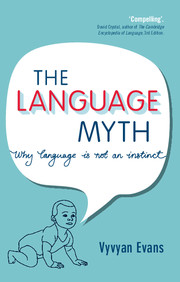Book contents
- Frontmatter
- Dedication
- Epigraph
- Contents
- Acknowledgements
- 1 Language and mind rethought
- 2 Is human language unrelated to animal communication systems?
- 3 Are there language universals?
- 4 Is language innate?
- 5 Is language a distinct module in the mind?
- 6 Is there a universal Mentalese?
- 7 Is thought independent of language?
- 8 Language and mind regained
- Notes
- References
- Index
1 - Language and mind rethought
Published online by Cambridge University Press: 05 October 2014
- Frontmatter
- Dedication
- Epigraph
- Contents
- Acknowledgements
- 1 Language and mind rethought
- 2 Is human language unrelated to animal communication systems?
- 3 Are there language universals?
- 4 Is language innate?
- 5 Is language a distinct module in the mind?
- 6 Is there a universal Mentalese?
- 7 Is thought independent of language?
- 8 Language and mind regained
- Notes
- References
- Index
Summary
This is a book about language, and about its relationship with thought and the mind. It is also a book about how we acquire language, and why different languages are so diverse in their sound systems, vocabularies and grammars. Language is central to our lives, and is arguably the cultural tool that sets humans, us, apart from any other species. And on some accounts, language is the symbolic behaviour that allowed human singularities – art, religion and science – to occur. In her Nobel Prize acceptance speech, the celebrated African-American writer, Toni Morrison, put things this way: “We die. That may be the meaning of life. But we do language. That may be the measure of our lives.” Language is clearly a big deal.
This book addresses a controversy that has raged in the behavioural and brain sciences since the middle of the last century: is language innate, something we are born with? Or does language emerge from use, based on more general mental skills and abilities? The dominant view, until recently, has been the former: we come into the world hard-wired with the rudiments of language. But this view now looks to be on increasingly shaky ground.
- Type
- Chapter
- Information
- The Language MythWhy Language Is Not an Instinct, pp. 1 - 26Publisher: Cambridge University PressPrint publication year: 2014



